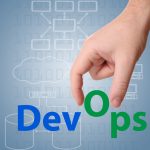Businesses having difficulties filling specialized IT positions

With most organizations now increasingly using a wide variety of software and IT tools to maximize their potential, keeping track of all your various services has never been more important.
This importance has been highlighted by new research from CA Technologies showing that those organizations that are able to adopt modern software development practices are seeing overwhelmingly more benefits than those who don't.
'App mapping' gives enterprises improved visibility into systems

The shift to containers and as-a-service delivery models introduces blind spots for many enterprises as they struggle to see the whole picture and can't determine the health of their apps and APIs.
Netsil, a new startup, is launching an innovative solution to this problem in the form of its Application Operations Center (AOC), a universal observation and monitoring platform for modern cloud applications.
Where can blockchain add value?

Blockchains and their use cases have evolved significantly since the advent of cryptocurrencies such as Bitcoin and Ethereum. And for a few good reasons. The fully decentralized system lowers transaction costs, improves record-keeping and enables complete transactional traceability. These benefits make blockchains ideally suited for the hyperconnected digital era -- one in which trust boundaries between devices, networks, applications and users are being constantly redefined.
But what makes blockchains credible? A blockchain’s network participants are bound by certain rules, which are continuously validated by peers. Several built-in mechanisms, including proof-of-work, proof-of-stake and consensus-based decisions ensure trust is maintained and strengthened. The transaction ledger is open to participants for analysis and auditing purposes at any time, with data being replicated across multiple participants. Blockchains eliminate the need for a central or federated trusted entity -- the middleman -- which results in the democratization of trust. This is why blockchain has been dubbed the Trust Machine.
Understanding DevOps metrics

In application, some metric are more suitable to particular processes and organization compared to others. When choosing DevOps for a particular organization, a clear understanding of DevOps metrics tools and cycle is desirable. The role of DevOps is primary for better performance and output regardless of the target organization.
Developments and operations popularly known as DevOps, is enterprise based software that describes the agile relationship between IT operations and development. The primary goal of DevOps is to foster this relationship by promoting better communication between the stated business units.
IT professionals need more security training for DevOps

New research has revealed that software developers are not receiving the training necessary to be successful at DevOps in their current positions.
According to the 2017 DevSecOps Global Skills Survey sponsored by Veracode and DevOps.com, 65 percent of DevOps professionals believe that knowledge of DevOps is essential when starting a career in IT. However, 70 percent believe that they did not receive the necessary training through formal education to be successful in today's DevSecOps world, which integrates security into the development and testing of software.
The benefits of intelligent DNS in DevOps projects

The DevOps model continues to gain traction because it’s an efficient and cost-effective development approach. It yields fewer errors, shorter development cycles and reduced need for expensive code fixes after deployment. One goal of DevOps is continuous development and deployment, which necessitates the automatic creation or removal of networks, as well as automated deployment to production.
Automation is important because the fewer the number of manual steps involved, the less likely that human error will disrupt the process. Intelligent DNS improves DevOps project lifecycles by integrating with your software development and automation tools. Let’s take a look at intelligent DNS and the advantages and upgrades it offers to the DevOps project lifecycle.
Delphix partners with Azure to ease cloud migration

Microsoft Azure is increasingly popular as a business cloud platform, but migrating to Azure often means bringing together data from a range of sources. Lack of access to this data can hinder development and slow delivery.
Data management specialist Delphix is launching a new Dynamic Data Platform for Azure, which offers enterprises the ability to streamline cloud migration projects, accelerate development and testing, and significantly reduce cost and complexity.
DevOps practices help improve the quality of open source components

The use of open source components can help speed up the software development process, but it comes with a risk if poor quality code leads to vulnerable applications being released.
The latest State of the Software Supply Chain Report from DevOps tools specialist Sonatype reveals that organizations which actively manage the quality of open source components flowing into production applications realize a 28 percent improvement in developer productivity, a 30 percent reduction in overall development costs, and a 48 percent increase in application quality.
New development environment helps bridge the gap between Dev and Ops

As the development cycle evolves, things like testing, monitoring and compliance need to be delivered earlier in order to speed up service delivery.
Enterprise software solutions firm BMC is launching a new development environment to help organizations compete in the digital economy.
DevOps automation boosts performance

The highest performing organizations have automated 72 percent of all configuration management processes. And those same high performers spend much less time (28 percent) in manual configuration processes that stall innovation and deployments.
In comparison, low performers are spending almost half of their time (46 percent) on manual configuration. These are among the findings of the latest State of DevOps Report by Puppet, which surveyed 3,200 respondents from organizations of all sizes and across multiple industries.
App developers want better feedback during coding and debugging

The ability of developers to do their jobs effectively is crucial to delivering reliable apps on time. App development company Perfecto has released the results of a new survey which asked developers how they focus their resources.
Among the findings are that 50 percent of user interface and user experience developers want better feedback during the coding and debugging process. Less than 25 percent say they actually get the timely feedback they need.
Demand for microservices skills is growing
Businesses forget good security practices in DevOps environments

Many organizations don’t enforce proper security measures in their DevOps environments, putting both the company and the product at risk. This is according to a new report by Venafi looking into security practices among DevOps adopters.
Using the same passwords for multiple machines or not even bothering to secure communications between machines are some of the most common issues, usually among organizations in the middle of adopting DevOps practices.
Solving digital problems takes too long

Resolving incidents that impact consumers takes IT teams approximately double the amount of time customers are willing to wait for a service that isn't performing properly, according to a new study.
The research by digital operations management company PagerDuty surveyed over 300 IT personnel in development and operations as well as over 300 consumers in order to identify the challenges of meeting customer expectations.
How to convince IT decision makers to embrace DevOps

Years ago, comedian Steve Martin joked about the best trick to play on a three year-old kid: "Whenever you’re around him," he said, "talk wrong." On his first day at school, the kid will raise his hand and say, "May I mambo dogface to the banana patch?"
Pitching a project for implementing DevOps at your company can make you feel a lot like that kid. To you, the ask is crystal clear. To your executives, it’s mumbo jumbo. Why? Because if you’re like lots of technical folks, you’re using technical terms to make your case. However, "technical" is not the language that your management team speaks when discussing new processes and tools. When you’re asking to "mambo dogface," they’re thinking about things like, "How many people do I need to implement this?" or "How many people will need to be trained?" and "How long will it take them to become proficient?"
Recent Headlines
Most Commented Stories
BetaNews, your source for breaking tech news, reviews, and in-depth reporting since 1998.
© 1998-2025 BetaNews, Inc. All Rights Reserved. About Us - Privacy Policy - Cookie Policy - Sitemap.
